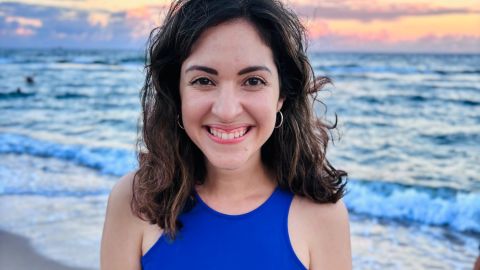I’m Fed Up With People Calling Me ‘Half-Latina’
[article_ad_lb] I was born in Moscow, Russia, to a Russian mom and Cuban dad

Photo: Courtesy of Irina Gonzalez
[article_ad_lb]
I was born in Moscow, Russia, to a Russian mom and Cuban dad.
After my family immigrated to the U.S. and settled in Miami, my life changed dramatically. Eventually, we moved to the southwest coast of Florida and, once again, everything changed. I went from being surrounded by Spanish-speaking Latino kids of all shapes and colors to being completely out of my element. This is around the time when all of those questions about my heritage began.
As many Latinos know, questions of “but where are you REALLY from?” are fairly common. For me, though, the questions often went deeper. Because I didn’t look traditionally Latina, due to my light skin, round face but dark eyes and hair, and yet I had the last name ‘Gonzalez’ so people were confused. Often, I was asked about my background and, when I told people that I was half-Russian and half-Cuban, they replied with an incredulous look and a “how did THAT happen?”
More than anything, though I was often told that I was not “Latina enough” (just like some of my favorite celebrities) or called a “half-Latina”.
Wait, a half-Latina? That, to me, simply never made sense.
A Latina is a woman of Latin American origin or descent. Those of us who identify as Latinx do so because we have cultural ties to Latin America, something which I can definitely relate to since my dad is Cuban, I lived in Cuba as a child, I speak fluent Spanish (not that this is a pre-requisite), I grew up on Latin food and I relate to almost everything I read about growing up Latino. So how can I just be half of something?
During my adolescence, it definitely took a long time before I truly understood what it meant to be Latina. Because I was born in Russia and felt connected to my Russian roots, I was confused. Growing up in a predominantly white area and having no other Latinx friends also created a big rift between myself and my Latin culture. But deep down, I always knew that I was fully Latina even if it took me some time to truly understand what that meant.
As someone who grew up as a light-skinned, mixed-race Latina, I acknowledge that there are many struggles. As Becca Reynosa recently put it in her The Odyssey essay: “I shouldn’t have to justify or prove my culture and heritage to those who question it, nor should anyone who comes from a mixed-race household. However, living in a society of inquirers, the sad fact is this: proving ourselves to everyone we meet is an exhausting task that we will never escape.”
Like her, I constantly feel the pressure to prove that I am a Latina, that I am a good immigrant, that I am an American, that I am just like everyone else. The pressure can be exhausting, honestly. Whenever someone else calls me a “half-Latina” or points out that I am not “Latina enough” because only one of my parents is of Latin heritage, I feel bad. Despite the many Latino celebrities that also only have one Latino parent but still identify as Latino, I didn’t always know how to reply to the countless exhausting questions about my heritage and those who asked me to prove myself as a true Latina—questions that came from white and Latinx friends alike.
Being told that I don’t “look Latina” happens often, as do comments that the reason why I don’t adhere to Latino stereotypes (like the “Spicy Latina” trope) is because I’m only “half.” But how can embracing my culture, such a huge part of what makes me who I am, be just half of the story? The struggles I feel as a half-Latina are real and they’re frustrating. The things I often hear as a mixed-race Latina are even more frustrating, to be honest.
It’s hard to explain why I find claims that I am only “half-Latina” to be so infuriating but I think it is mainly because it feels like an insult to my cultural background. My father didn’t raise me to be half Cuban… How could he, really?
Growing up, my Russian mother cooked Cuban food, spoke Spanish to me and certainly practiced the chancletazo when I misbehaved. She didn’t teach me to be half of anything either.
The truth is that there is simply no way to teach your kid half of a culture—you either teach them everything you know and love (and even some things you may not love, such as machismo) about the culture or you don’t. I didn’t grow up half-Latina in the same way that I didn’t grow up half-Russian or half-American either. Embracing all three of these cultures that make me who I am today means that they are all integral parts of me, no matter what. I’m not half of everything, I am all three of them combined.
Recently, Emilia Benton wrote on PopSugar Latina: “As an American-born half-Latina, one of my biggest pet peeves is having people ask me: “Where are you from? No, where are you really from? Where are you from from?” That’s a hardly disguised attempt to ask “What are you?” It’s a pet peeve, because I’m not just one thing. Yes, I’m half-Peruvian, but I feel it’s incorrect to say I’m from Peru, as I wasn’t born there and have never spent more than two weeks at a time there, much less lived there. But I am Latina, so what if it’s only half?”
And I can relate: As a Russian-born Latina immigrant who became a proud American citizen, I can tell you that culture and heritage is complicated. But I can also tell you that my culture and my heritage is beautiful and it’s all mine.
So, please, stop calling me a half-Latina just because I have one Latino parent. That Latino parent, along with my non-Latino parent who learned plenty about our culture during my parents’ 34+ year marriage, taught me almost everything I know about being Latina.
And you know what? There is nothing “half” about that.
[article_ad]

















